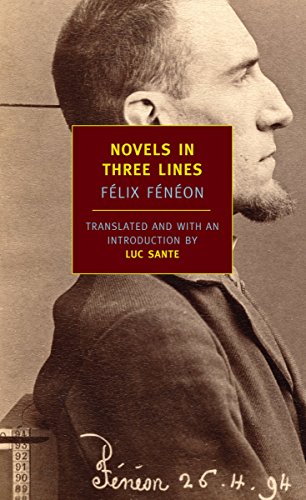


Novels In Three Lines
S**S
Short shrift
The reader, failing to spot Julian Barnes' over-ripe praise, slipped through the book in error and discomfort... This is a collection of over a thousand 'faits-divers' or newspaper fillers that the French dandy Felix Feneon (1861-1944) was paid to assemble from local papers for the amusement of the metropolitan readers of 'Le Matin'. It was actually his sonorous mistress, Camille Plateel, who collated them and deserves the credit for leaving the legacy of this snapshot album of France in 1906. It's diverting enough: a catalogue of hit-and-run deaths (then a novelty), suicides, accidents (especially small children), jealous lovers (especially those partial to projecting acid), thefts (telegraph cables are an obsession), sexual abuse (incest and geriatric rape score highly) and small-p politics (dock strikes, religious education, military incidents). The relaxed journalistic protocols of the time enabled Feneon to indulge his literary streak and these incidents are related in a clause-riddled, author-enhancing manner that often obscures the incidents described. Translator Luc Sante might have won awards and write for the New York Review, but I reckon he struggles - as many French (or Belgian) speakers do - with the gerund. Sante certainly apes Feneon's pretentiousness with approval. The title 'Nouvelles en trois lignes' should more properly have been translated as 'the news in three lines' - or, at the very least, 'stories in three lines'. They ain't 'romains'. Sante's introduction is similarly starstruck by Feneon's intellectually indulgent life but has its merits notwithstanding; while the book is satisfyingly peppered with grim, contemporary images of crime scenes and low-life activities.
S**L
Great book/good transaction.
This is an excellent item/book. Was just as described.
H**H
3.5 stars -- Gems, but filler, too
By turns hysterical and humbling, this collection of one and two liners will bring home the reality that not that much as changed in the last hundred years: people are still gloriously goofy. It takes Felix Feneon, however, to capture the essence of that je ne sais freakin' quoi that marks some lives as a warning to others (. . . who had mistaken the third story window for the door is dead; . . . who had just returned from Lourdes, cured of disease, died by mistake; . . . died of fear because a truck nearly ran her over.) Written with his tongue firmly planted in his cheek, these fleeting obits will engage both your horror and your funny bone. Politically incorrect in every way, thank goodness. P.S. Not all are gems, there are pages of filler, too.
D**S
An Amazing Book
A great book, opening up an aspect of modern literature that needs to be much more fully explored and understood. In his celebration of the quotidian, Feneon made it clear that the real world offers all that is needed to refresh one's vision. We could not have had Rauschednberg without Feneon, though I've no idea if he ever read this brilliant, modest book. Great introductory essay by Luc Sante makes this an even more important book for anyone trying to understand why so much modern art feels the way it does.
J**T
art and life in a blender, taken in teaspoon doses
Hey, James. 10,000 thanks for turning me on to Novels in Three Lines. WHAT a great book. Talk about all that "soul of wit" stuff. Very humbling. 1,000 lessons in the potential in compression. A handbook for every modern poet--except the obsfucating gas bags, of course; gotta leave some space for them. And, what a relief, no ersatz haiku. These poems don't pretend to be anything. They are what they are. Droll, piercing, witty, hilarious, self-effacing (especially the three stories in three lines entries). Art and life in a blender, taken in teaspoon doses.
Trustpilot
2 weeks ago
2 months ago